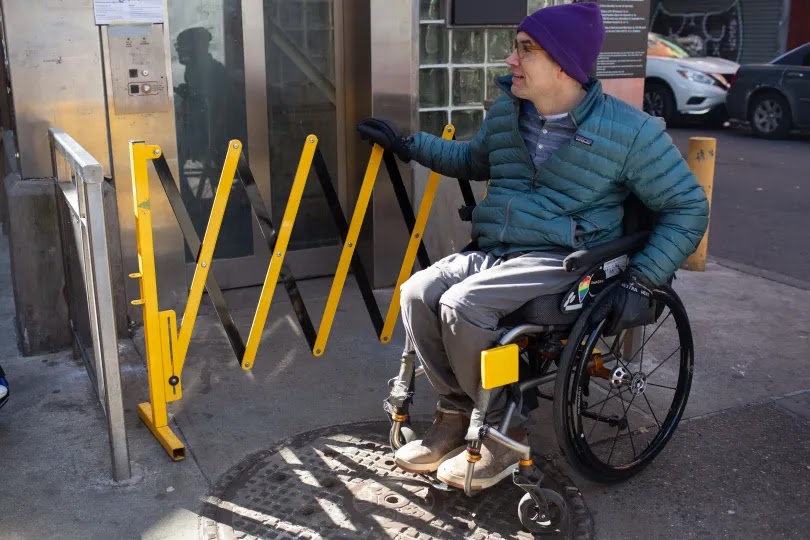Disability-rights advocate Sasha Blair-Goldensohn had to travel in the wrong direction for several subway stops due to a nonworking elevator at the Simpson Street station in The Bronx, March 15, 2023. | Ben Fractenberg/THE CITY
By Jose Martinez, The City
This article was originally published on by THE CITY
NEW YORK - After battling advocates in court for years over their push to increase subway access for New Yorkers with disabilities, the MTA last year found common ground with some of its most vocal opponents, agreeing to equip most stations with elevators or ramps by 2055.
Nearly a year later, the two sides remain at odds on another elevator-related federal court case that was not settled. That case accuses the MTA of failing to properly maintain the lifts that are in about 25% of the nearly 500 subway and Staten Island Railway stations.
In a letter Thursday to Governor Kathy Hochul and officials from the MTA and the state Transportation Department, organizations that assist people with disabilities — along with elected state and city officials — said last year’s settlement “means very little” unless the transit agency reforms its elevator maintenance practices.
“It just kind of feels like you can’t do one and not the other,” Jessica Murray of the Rise and Resist Elevator Action Group told THE CITY. “If people need to rely on an elevator and they have an unreliable elevator, they won’t use the subway.”
MTA statistics show that, since 2017, subway elevators have a 95.4% availability rate. Riders with disabilities who rely on those elevators, however, say outages are too frequent, with advocates citing an average of 25 elevators breaking down daily.
More recent numbers are worse.
A City Council report from last month used MTA elevator-performance data to show that, on average, 10% of the more than 350 subway elevators were out of service at any given time in January — and that privately maintained units have longer outages.
“I don’t feel comfortable knowing that I’m going to get a working, functioning elevator when I get to the subway station,” said Dustin Jones, a wheelchair user who is among the plaintiffs in the elevator maintenance lawsuit. “It burns me, it burns me, it really annoys me.”
Looking for a Lift
On Wednesday, riders with disabilities, elected officials and advocacy groups will rally prior to the MTA’s monthly board meeting to press for a commitment to boost elevator reliability and ease problems caused by outages that can prevent people from reaching platforms and entering or exiting stations.
They are also calling for the agency to improve communication to help riders avoid out-of-service elevators, and to provide more options for when people do encounter them.
“Some of it is really basic, such as providing notification on the train about an elevator outage in the way they do for other service disruptions or providing point-to-point shuttle service,” Chloe Holzman, senior staff attorney at Disability Rights Advocates, a nonprofit legal rights center for people with disabilities, told THE CITY. “What they do at the moment is just ineffective and an accommodation is not reasonable if it is ineffective.”
MTA spokesperson Meghan Keegan said the agency maintains “a robust” program to keep elevators in working order, adding that officials are making “every effort” to fill vacancies among elevator-maintenance staff.
“When outages do occur, the MTA has a multi-faceted system to alert customers of alternative transit options in a timely manner through multiple outlets, along with the tools to plan those trips,” Keegan said.
In 2021, a federal appeals court reinstated the elevator-maintenance lawsuit, which had previously been tossed out by a lower court after the MTA said subway elevators were available 96.5% to 98.7% of the time.
/cdn.vox-cdn.com/uploads/chorus_asset/file/20017511/d24b1fcf2c1c9931b9f5137a600c6b2fa1a7.jpg)
As part of the 2022 deal to make 95% of all stations comply with the Americans with Disabilities Act (ADA) in just over three decades, the MTA agreed to maintain an accelerated pace of subway station accessibility projects in future five-year capital programs. Between 2020 and 2022, the MTA completed 17 ADA station projects — more than four times as many as were completed from 2017 to 2019.
The current capital plan calls for 12 more stations to be made ADA-compliant in 2023, with work starting this year at an additional 17.
While advocates for those with disabilities praised the commitment from the MTA to keep adding elevators to the transit system, they said breakdowns remain an obstacle.
Close to a year ago, Sharon McLennon-Wier, executive director of the Center for Independence of the Disabled New York, was among those who applauded the MTA for the commitment to near-universal accessibility in the subway.
But the continued court fight in the elevator-maintenance case, she said, is “disappointing.”
“There’s still issues and we’re still at an impasse here,” said McLennon-Wier, who is blind.
On a recent trip to The Bronx, Sasha Blair-Goldensohn rolled his wheelchair up to the street-level elevator leading to the southbound side of the elevated Simpson Street station — only to find it was out of service.
Blair-Goldensohn, who is also among the plaintiffs in the cases against the MTA, had to instead take an elevator on the other side of the station a few stops north before having to turn around to catch another train back to Manhattan.
“This is exactly the problem,” Blair-Goldensohn told THE CITY. “It is so frustrating.”
THE CITY is an independent, nonprofit news outlet dedicated to hard-hitting reporting that serves the people of New York.

















Comments
Post a Comment